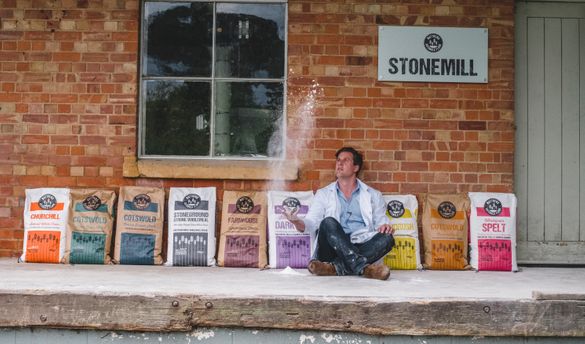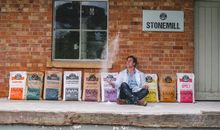 04 Jan 2022
04 Jan 2022
Anyone who shops for food on a regular basis will know that prices have been climbing steeply. There are many reasons for this - certainly a series of cereal crop failures world-wide have not helped. Grain prices have increased to the highest in memory.
Which is why, as the MD of one of Britain's leading artisan milling companies, I believe it is high time we started to communicate more with our consumers. We need to discuss how we produce food and where we get it from and do some soul-searching.
Climate change is occurring, so we will see more crop failures and more price hikes - which begs the question: surely doing the same thing over and over again and expecting a different outcome is a definition of insanity?
Commodity farming means spraying fields full of chemicals and driving huge ploughs into the land every year. All this breaks up the microorganisms which support plant life in the soil… Why, then, are we surprised when harvests eventually begin to fail? If the tiny top six inches of fertile soil continues to degrade, then how are we supposed to grow food, mill grain, bake bread?
This is the road we are on. Prices will continue to spike, cost of living will rise and rise, and so on…
Our present highly industrialised food system will have trouble feeding us in a quarter of a century - never mind supporting generations in 200 years time. It is not built around long term soil health.
The big multinational organisations which create our food do have the power to change this and would do so if there was enough pressure from consumers demanding change. However, there is a worrying lack of awareness. Why should the average person on the street worry about something as seemingly obscure as soil health?
Believe me, they should. I say that as a person who produces that most basic of ingredients - the flour in our bread.
The good news is that we have the techniques and the understanding to make the urgent changes.
Buying British and buying local can help in reducing food miles. It also creates a “circular economy” which helps us manage food production systems better. A local economy creates a stronger connection between consumers and producers. It supports local jobs and skills which in turn helps increase demand for sustainable locally produced products.
I know people in the British meat industry who now say we should eat less meat. But they add: “Let the meat you buy be top-quality traditionally grazed stuff which ticks every environmental and sustainability box.”
This message can easily be translated into the world of bread and flour where a highly processed supermarket loaf is about as environmentally friendly as a landfill site.
Real bread is just flour, water, salt and maybe some introduced yeast. That's it. I am looking at a cheap white loaf and the label says: “Preservative (Calcium Propionate), Emulsifiers (Mono- and Di-Acetyl Tartaric Acid Esters of Mono- and Di-Glycerides of Fatty Acids), Spirit Vinegar, Rapeseed Oil, Flour Treatment Agent (Ascorbic Acid).”
Is that bread?
I can tell you that the farmer who grew the cut-price wheat required large amounts of fertiliser and chemicals to bring up the yield. The bread would not be so cheap if those yields weren't miraculously high. But high yields come at the cost of degraded soil.
I believe that nutritionally - grain for grain, gram for gram - good local milled regeneratively farmed flour can end up being much better value than something that looks cheap but which contains very little. Bread which represents far more bang for your buck, both in terms of fuelling the human body and in maintaining a sustainable planet.
Moreover real bread made from real flour makes economic sense. If you agree that proper bread should just be flour, water, a pinch of salt and maybe some yeast, then you might be surprised to know that a loaf made from sustainably produced flour from one of England's smaller mills costs less than the ingredients of its cut-price supermarket cousin. For the average 800g loaf: eight pence cheaper.
It's a no-brainer. Our politicians should be supporting more thoughtful, intelligent, localised forms of agriculture and food production with grants for farming businesses to grow grain under the regenerative model. Products should have clear and informative labelling and there should be a legally recognised environmental rating system. This should be matched by education in schools with farm-walks, mill tours, and baking lessons added to the curriculum.
Businesses should adopt sustainability as part of their strategy and source sustainably from regenerative farms. Producers should be incentivised with premiums for transitioning to a sustainable regenerative model. Some businesses are already doing it.
We Brits are far more food-savvy and soil-conscious than we get credit for. We could set out to be an example to the world.
The costs of NOT doing all of the above are frightening. It's a well known fact that the price of bread is a measure of political stability. We know this, yet we also know that unless we do something, soil erosion will continue to the point where we'll struggle to grow food. More and more will be imported, which will mean higher prices and more strain on the environment elsewhere.
We have knowledgeable people in this country who are already working towards a better, more sustainable food future. We must listen to them and start making changes.
For more information or an interview with Bertie Matthews, please contact Kath Hope at kath@rawfoodanddrinkpr.co.uk or 07515632089.
ENDS
Editor's Notes
Matthews Cotswold Flour's mission is to lead the transformation of the speciality baking products market into the 21st century and they aim to achieve this through supporting sustainable food sources and developing products that enhance nutrition, taste, understanding and experience.
Family Business: With a milling legacy spanning eight generations, Matthews Cotswold Flour is one of the UK's oldest family-run flour mills. Trading grain and milling flour in the heart of the Cotswolds since the 1800s, the mill believes passionately that their local partnerships, traditional stoneground milling methods and premium grains make for better baking. They are proud to offer premium quality Organic and Stoneground Wholegrain flour, using grain from local farmers and time-honoured milling techniques.
Regenerative Farming: Through their local “Cotswold Grain Partnership” and a system of fair trade pricing, Matthews Cotswold Flour works with farmers to grow in a sustainable way that protects the soil and develops wildlife. By giving back some profits to the farmers Cotswold Flour is able to support new regenerative farming practices.suggests.
Product Range: Matthews Cotswold Flour's range of over 30 different blends providing an unrivalled choice of unique artisan flours for both amateur and professional bakers. Matthews Cotswold Flour has over 100 years of experience which they have combined with a 'start up' mentality to put them at the forefront of speciality flour. Matthews Cotswold Flour supplies its ever-expanding range of flours to professional and home bakers through its online shop and retail and wholesale outlets.
Award Winning Products: Matthews Cotswold Flour boasts a host of awards for many of the products in its outstanding range of flour.
For more information on Matthews Cotswold Flour visit www.fwpmatthews.co.uk and follow @cotswold flour on Instagram, Facebook or Twitter. For more recipes and sourdough inspiration visit foodbodsourdough.com and follow elaine_foodbod on Instagram.
For more information, an interview with Bertie Matthews, recipes and images please contact Kath Hope at kath@rawfoodanddrinkpr.co.uk or 07515632089.




